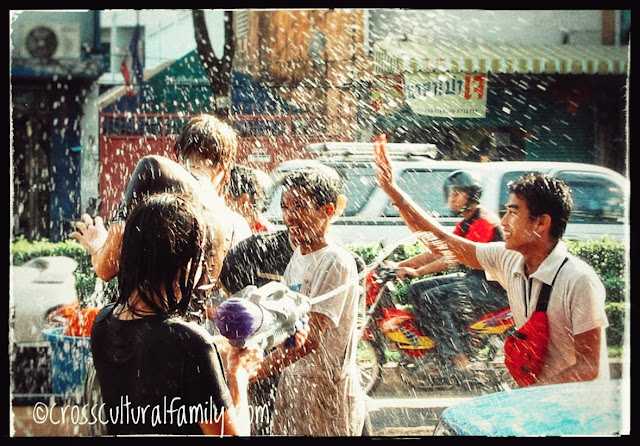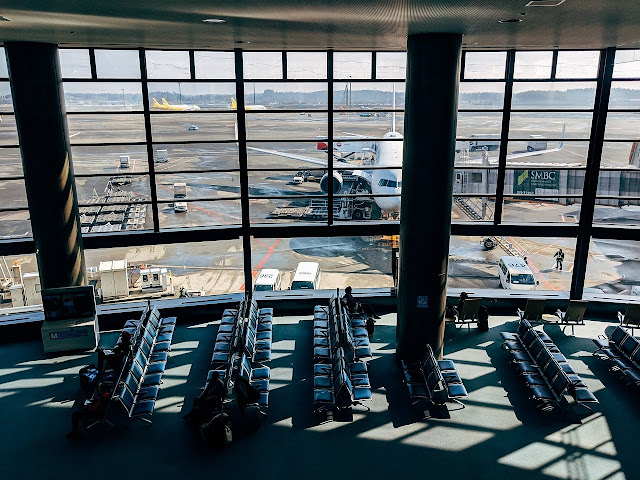Songkran: More than Just a Water Fight
If you've been living in Thailand for a while you may be sick of hearing about Songkran, but here's an introduction for those of you new to Thai New Year.
(Originally written for the April 2016 BAMBI News magazine; sorry for the out-of-date data - I'll try to update it at some point...)
Perhaps one of the most famous holidays in Thailand is Songkran, the Thai New Year. Celebrated 13-15 April each year, for most non-Thais, Songkran is synonymous a nation-wide massive water fight. (Ah fond [?] memories of going about on the back of a pick-up truck with friends, splashing and getting splashed with water and smeared with white chalky paste...!)
But Songkran rituals did not begin with raucous water fights, and if you’ve been here over Songkran in the past, you’ve probably heard some Thais lament that the water rituals have become distorted and gotten out of hand these days.
Songkran traditions
Yes, water plays a central role in the holiday: Songkran is a time to symbolically wash oneself of the past (and, practically, to tidy up one’s home and community), and to ritualistically clean Buddha figures with water. But the water wasn’t meant to be thrown in large quantities, rather, it was to be gently sprinkled over the hands (or a buddha figure) in a show of respect and symbolic cleansing.Songkran is a time for families to gather, and to pay respect to the elders. Many people also go to the temples in the morning to pray and make merit.
 |
| Bottles of scented water on sale. |
In our family compound, the Thai New Year means going around the houses visiting the older relatives for the rod naam dum hua ritual: we kneel in front of the elders, pour a few drops of scented water on their hands over a big embossed silver bowl, and wish them “Sawatdii pii mai” with a reverent wai. The elder then usually places a hand on us to give a blessing and best wishes. Little gifts are presented, like jasmine wreaths and bathing-related items such as a little towel or soap, which apparently comes from the custom of bathing the elders in the old days.[1]
Another more traditional gift to the elders is toilet powder. The National Culture Commission describes it as: “a preparation of soft chalk powder called ‘din saw phong’ mixed with scented water which is refreshing to the skin. Sometimes the powder is ready-mixed with attar of roses and may be applied lightly with a towel or handkerchief. Such toilet preparation is called ‘paeng sod’ or fresh toilet powder.”[1] Nowadays, if you go into the water fights, it’s likely you will get to experience the cooling effects of this powder, as it is respectfully (or not!) smeared across your face.
And what about the water fights?
As for the water fights, it’s mostly good fun, although one hears stories about women (especially farang and tourists) getting groped in the melee around Khaosan Road. Personally, I object to the introduction of using ice water! A grown-up person (again, especially farang) can typically expect to be completely and utterly drenched by the time they get down their soi, but I’ve heard colleagues say how they were pleasantly surprised how gentle and considerate the partying water-splashers on the streets were if they saw you were with young children. |
| Must be Songkran - 'aloha shirts' have gone on sale! |
Traffic accidents: “Seven Days of Danger”
 |
| Pattaya police try to make a point, a call to drive safely, with this display of crashed vehicles... |
| Source: Data from the Road Safety Directing Center, cited in Richard Barrow’s blog post (April 16, 2015), “Full Road Accident Statistics for Songkran 2015”. (http://www.richardbarrow.com/2015/04/full-road-accident-statistics-for-songkran-2015/). The lines show the rough trend of decreasing accidents and injuries, with a slight increase again in 2014 and 2015, but the numbers remain high. ** I haven't had a chance to update the chart, but here is Richard Barrow's blog with data for 2016: http://www.richardbarrow.com/2016/04/full-road-accident-statistics-for-songkran-2016/ ** |
In fact, Thailand has a terrible track record when it comes to road safety all year round, ranking 2nd highest in the world for the number of road deaths per 100,000 inhabitants per year (Libya was number one).[3] These tragic annual figures only highlight the fact that there’s yet much to do to effectively reach people—especially the young—with road safety awareness and stronger law enforcement.
So if you decide to travel over the holidays, do be extra wary of drunken drivers, especially on motorcycles, and especially at night. (It’s also wonderful how congestion-free Bangkok is over Songkran!).
Tips for families
While splashing around with kids is great fun, here are some tips and suggestions (inspired by & adapted from BKK Kids), on keeping it enjoyable and safe:- Especially with younger children, avoid places like Silom Rd., Khaosan Rd., CentralWorld, and RCA, where the water fights can get crowded and rowdy.
- Protect your electronic gear and valuables from water: toss your phone, camera, money, cards, etc. in a sealable plastic bag. (You might do this even if you’re not planning to go to a water fight, to be safe.)
- If you are going to take the Skytrain afterwards, remember that the air-conditioning will be extra cold on wet skin. Try to wear quick-drying clothes and footwear, or, if possible, have a towel and change of clothes ready.
- Lock your car and taxi doors just in case, as it’s not unheard of for some revellers to open doors and splash/chalk the car passengers. (On the other hand, if you do want to get drenched, being on a tuk-tuk or the back of a pick-up truck is a guarantee that you will become a target.)
Stay safe and enjoy! Sawatdii pii mai!
References
[1] National Culture Commission (23 February 2007). “Songkran: Bathing Ceremony.” Available: http://www.thailandlife.com/songkran-festival/bathing-ceremony.html, accessed 23 February 2016.[2] (April 17, 2015). “Road toll exceeds last year's figures”, The Nation. Available: http://www.nationmultimedia.com/national/Road-toll-exceeds-last-years-figures-30258126.html. Also Richard Barrow (April 16, 2015) on his blog: “Full Road Accident Statistics for Songkran 2015”, Richard Barrow in Thailand (http://www.richardbarrow.com/2015/04/full-road-accident-statistics-for-songkran-2015/). Both cite figures from the Road Safety Directing Center, http://www.roadsafetythailand.com/main/index.php.
[3] WHO (2015). "Global Status Report on Road Safety 2015". Available: http://www.who.int/violence_injury_prevention/road_safety_status/2015/en/
[4] BKK Kids (10 April 2015). “5 Tips for Enjoying Songkran with Kids”. Available: http://www.bkkkids.com/blog/5-tips-songkran-kids/
** For more detailed descriptions of Songkran’s origins and rituals around the country, check out “Songkran Festival in Thailand” http://www.festivals-holidays.com/songkran-festival-thailand/, or, from an official Thai perspective, go to the Tourism Authority of Thailand’s website and search for “Songkran”! (http://www.tatnews.org//?s=songkran) **



Comments
Post a Comment